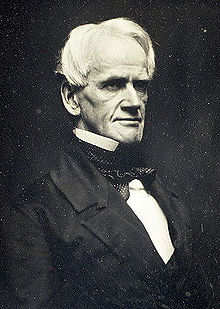Horace Mann
| Horace Mann | |
|---|---|
 |
|
| Member of the U.S. House of Representatives from Massachusetts's 8th district |
|
|
In office April 3, 1848 – March 3, 1853 |
|
| Preceded by | John Quincy Adams |
| Succeeded by | Tappan Wentworth |
| Personal details | |
| Born |
May 4, 1796 Franklin, Massachusetts |
| Died | August 2, 1859 (aged 63) Yellow Springs, Ohio |
| Resting place |
North Burial Ground, Providence, Rhode Island |
| Political party |
Whig Free Soil |
| Spouse(s) | Charlotte Messer Mann (d. 1832) Mary Peabody Mann |
| Relations | Thomas Mann (father) Rebecca Stanley Mann (mother) Stephen Mann (Brother) Louise Mann (Sister) |
| Children | Horace Mann Jr. George Combe Mann Benjamin Pickman Mann |
| Alma mater |
Brown University Litchfield Law School |
| Occupation | Lawyer Educator College president |
| Signature | |
Horace Mann (May 4, 1796 – August 2, 1859) was an American politician and educational reformer. A Whig devoted to promoting speedy modernization, he served in the Massachusetts State legislature (1827–37). In 1848, after serving as Secretary of the Massachusetts State Board of Education since its creation, he was elected to the United States House of Representatives. Historian Ellwood P. Cubberley asserts:
No one did more than he to establish in the minds of the American people the conception that education should be universal, non-sectarian, free, and that its aims should be social efficiency, civic virtue, and character, rather than mere learning or the advancement of sectarian ends.
Arguing that universal public education was the best way to turn the nation's unruly children into disciplined, judicious republican citizens, Mann won widespread approval from modernizers, especially in his Whig Party, for building public schools. Most states adopted one version or another of the system he established in Massachusetts, especially the program for "normal schools" to train professional teachers. Mann has been credited by educational historians as the "Father of the Common School Movement".
Horace Mann was born on May 4, 1796. His father was a farmer without much money. From ten years of age to twenty, he had no more than six weeks' schooling during any year, but he made use of the town library. At the age of 20, he enrolled at Brown University and graduated in three years as valedictorian (1819). The theme of his oration was "The Progressive Character of the Human Race." He then studied law for a short time in Wrentham, Massachusetts and was a tutor of Latin and Greek (1820–22) and a librarian (1821–23) at Brown University. During 1822, he also studied at Litchfield Law School and, in 1823, was admitted to the bar in Dedham, Massachusetts.
...
Wikipedia
